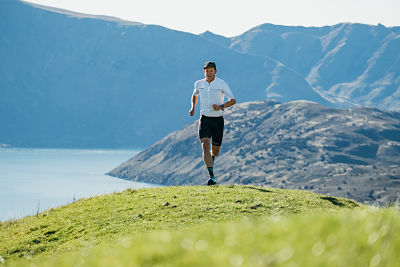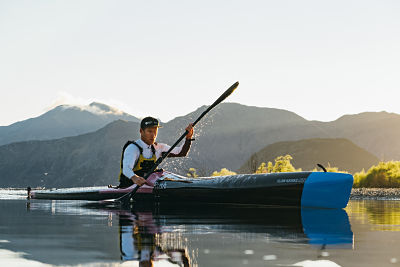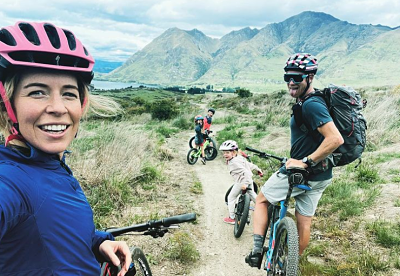When I’m dealing with setbacks, someone telling me “remember, if it were easy, everyone would do it” can really grind my gears. It doesn’t offer a solution to the problem at hand.
But when I take a step back I can appreciate that they're trying to offer a sense of perspective. After all, if endurance sports were easy to train for and the events offered a guarantee of success, more people would be cashing in on the physical and mental benefits of racing ultra marathons and triathlons.
But these endurance pursuits are still very much ‘minority’ sports in the grand scheme of things and that’s in large part because committing to endurance sports carries risks, road blocks and setbacks that require considered navigation.
One thing I’m beginning to appreciate is that after more than 15 years competing in multisport, IRONMAN and adventure racing at an elite level, I’ve developed (through necessity) a pretty handy bag of tools to help deal with setbacks.
So, I’ve shared five specific setbacks here that have brought me sadness, frustration, disappointment, disillusionment, and ultimately experience. My hope is that they will provide you with actionable advice that platitudes like “if it were easy, everyone would do it” can’t…
Injury
Let’s start with an obvious one. In this game, we’re all ‘between injuries’ to an extent (I’m typing this with my right arm in a brace after developing ‘intersection syndrome’ in a kayak race on the weekend).
Injuries suck. No two ways about it. However, focusing on the ‘suck’ won’t help. Creating a solutions-based mindset will.
Gather the information (get a firm diagnosis from the right medical professionals) so you understand what you can’t do, but more importantly, what you CAN do. Right now I can’t kayak, but I can ice, stretch and strengthen my arm as per my physiotherapist’s guidelines. I can also run and bike (the beauty of multi-disciplinary sport!).

I’ve coached runners with Achilles or calf injuries who can still use an elliptical machine at the gym or do pool running, as well as loads of strength and mobility work.
The point being, if we focus on what we’re able to do, we’ll exist in a much healthier headspace, sense progression and be a nicer person to hang out with.
Event cancellation
There was a time when events were only cancelled due to freak weather conditions or security threats, but most of us will have experienced the pain of event cancellations first-hand in recent years.
Here in New Zealand, we’re on the verge of the latest COVID-19 variant outbreak and events are falling over like dominos as the peak race season rolls around. How can we cope with the disappointment of our event being cancelled when months of time, energy and financial investment have gone into preparation?
My advice is to allow the emotion to take place. You’re allowed to be gutted, it shows how much you care about what you do. But once the emotion subsides, step back and take a philosophical look at your current situation.
When we prepare to take on any endurance event, we start a chain effect of behavioural and attitude adjustments that ultimately prioritise our physical and mental wellbeing. We understand that health, fitness and attitude are paramount to our chances of achieving our race goals.
So the big question I would ask myself when the race goal is taken away is: do I regret what I’ve done?
I’d be willing to bet that most people who reflect on the process they have undertaken to be ready for a race will be proud of who and where they are because of it. Races are the icing on the cake, but we still have to bake the cake first and that’s where true meaning and growth is discovered.

If we don’t love the journey as much as the destination, it’s unlikely we were in the right game in the first place. Everyone I meet in endurance sport genuinely loves the journey, the training, the toil. And that gives me hope that during a turbulent few years of event uncertainty and cancellations, we’ll resurface when the events are in full swing again and we’ll hit the ground running.
Lack of fitness
It's important to note that fitness is a moving target, it’s always moving up or down and it can’t always move upwards. Letting fitness drop (either intentionally during an off-season or because of injury/time etc) isn’t terminal.
Of course, the goal with fitness is to peak when it matters most (i.e. the day of your ‘goal’ race) so if fitness is lacking on this particular day then disappointment is justified. But always place fitness in the context of your life.
Is it lacking because you made some poor decisions? Well, you only have yourself to blame.
Or is it lacking because of an injury or other life event that took control of the situation unexpectedly? This can be where a little perspective can help to put fitness into context. Be kind to yourself; we’re not all full-time athletes and we can take pride in other areas of our lives.
The best advice my coach ever gave me was “don’t chase fitness, focus on the process and the fitness will come to you”. I particularly like this angle because it removes the anxiety of ‘getting fit’ and helps return our attention to the things we enjoy doing along the journey.
Losing sponsors or missing qualification for your 'goal' race
Sometimes we can be the victims of our own success.
With increasingly competitive performances comes increasingly higher expectations. Sponsors and qualification slots become an added incentive when ‘just finishing’ has lost its gloss. However, there are no guarantees and all of the hard work can still land us short of other people’s expectations or qualification criteria.
This is where controlling the controllables is a key message.
Sometimes a sponsor won’t feel aligned to our personal values and what we represent, but don’t change who you are. Another brand or sponsor will be attracted to you.
If your performance is to blame, go back to the process and work your way back towards the next good race result. Identify the mistakes and make the necessary changes.
A new coach with new ideas might be worth considering or perhaps just go back to the same process and trust it will work next time. Take time to reflect and be honest with where things fell short, but once again look to the controllables and place your attention here, rather than focusing on sponsors’ decisions, other competitors or selection criteria.
Family, work and life commitments
Technically not a setback but more a part of the reality of the decision to include endurance sport in your lived experience of this chaotic modern world. At times, you’ll feel short-changed by your ability to train and compete due to other aspects of life competing for your time, energy and attention.
The biggest change to my own sporting aspirations came with the birth of my children Flynn and Matilda. Suddenly my decisions and commitment levels were influenced by my overwhelming sense of obligation to put my children first.
Initially, this felt like a compromise on my ability to be an athlete, but over time it’s given me more appreciation for what endurance sport means to me and what a privilege it is to have a body and mind capable of non-stop exertion for hours on end (just like parenting!).
My wife and children, alongside my coaching business, provide a healthy balance to my training. Sometimes it’s exhausting and feels like I’m no good at any of them, but the truth is I believe each makes me better at the other.

Exercise gives us time, clarity and energy. Even when we’re stressed or rundown, it will offer some momentary respite. So, my advice for those who find themselves overwhelmed by the totality of life’s happenings is to remove the expectations that frame training (e.g. having to hit a specific power or pace target) and just go out and move. All movement will be of benefit, no matter how short, slow or specific.
A 10-minute jog at lunchtime might not be the one-hour tempo run in the program, but if that’s all you can manage today, it will support your journey on some level. You’ll still be moving forward, both in mind and body. Be sure to be honest with your coach and support team so they can add context to your training decisions. A good supporter will always back you on this.
Setbacks are inevitable, which is part of why we do this endurance stuff and most of the world doesn’t. Setbacks will always teach us something. Much like the 35km mark in a marathon, we’re forced to ask ourselves some big questions and investigate whether we have the capacity to come up with the answers.
Remember, we CHOOSE to do endurance sport. There’s no sacrifice here, we choose to do this and we know we are better for it in the end. Setbacks force us to face some big questions, but most people will manage to avoid those moments their entire life, if comfort is what they lean towards.
In the end, I know I would take the path we are on, setbacks and all, rather than a life of guaranteed comfort (boring!).
